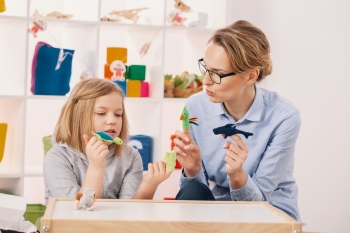
What is play therapy? Play therapy is a structured approach to therapy that builds on the natural language of children, the language of play. Therapists use various play materials to help children express what is troubling them when they are not able to verbalize their thoughts and feelings as adults do in more traditional talk therapy. In play therapy, toys are like the child’s words and play is the child’s language. Through play, therapists may help children learn more adaptive behaviors when there are problems with emotional or social skills.. The major goals of play therapy are the enhancement of self-esteem and decision-making skills. These tools help children to handle life’s various stressors as well as providing the confidence and insight necessary to resolve any problem behaviors. Play therapy is widely regarded as the most effective form of therapy for children ages 3-11 years.
Play Therapy / Family Therapy is a method that offers significant help for childhood issues and problems including: peer interactions, separation anxiety, difficulties reading social cues, toilet training, withdrawn behavior, school misbehavior, inattention, impulsivity and aggression, playing in an age appropriate way, separation and divorce as well as various trauma experiences. Play-Family Therapy can also be used preventively when parents feel that the situation may decline without attention to a particular concern.
(strategies for telling a child about the upcoming appointment)
After an evaluation, the child’s play therapy sessions begin with twenty minutes of family therapy, which addresses the issues of concern: parental divorce, fighting, autism, ADHD. During the family therapy, the therapist meets with the child and the accompanying parent. During the play therapy, the therapist meets in a playroom with the child. Through the play, the child’s conscious and unconscious communication allow for deeper insight into areas of concern. During play therapy children use their whole mind and body and reveal their unconscious thoughts, fears, anxieties and wishes. The therapist is continually tracking the metaphors or themes of play during the session to understand the root of the child’s problematic behaviors. These patterns are shared with the parents at regularly scheduled parent sessions (without the child present) where the therapist will work with the parents to develop home behavioral strategies.
By confronting problems in a play therapy setting, children can find healthier solutions. Play therapy allows children to change the way they think about, feel toward, and resolve their concerns. Adults use words to express their concerns, seek help and eventually gain mastery over the problem. Children use play to master feelings, concerns and confusing or unsettling life events. Play therapy provides children with a clinical setting in which they can create lasting resolutions that can be safely discovered, rehearsed, mastered and adapted into lifelong strategies. To learn more about how play therapy can support the work that parents are already doing.. . .
Play therapy is a therapeutic approach used primarily with children to help them express themselves, communicate, and process their emotions through play. Here are some interesting and fun facts about play therapy:
- Historical Roots: Play therapy has its roots in the work of psychoanalyst Sigmund Freud and child psychologist Melanie Klein, who recognized the significance of play in understanding children's emotions and experiences.
- Child-Centered Approach: Play therapy is child-centered and respects the child's autonomy. It allows them to lead the play and choose the activities that resonate with them.
- Nonverbal Communication: Children often find it easier to express their thoughts and feelings through play and creative activities rather than using words alone.
- Symbolic Expression: Play therapy often involves the use of toys, art materials, and games to provide a safe and symbolic way for children to communicate their inner world.
- Safe Environment: Play therapy creates a safe and nonjudgmental space where children can freely explore their feelings and experiences without fear of criticism.
- Imagination Exploration: Play therapy encourages imaginative play, allowing children to process and make sense of their thoughts and emotions in a less direct and more symbolic way.
- Various Modalities: Play therapy encompasses different modalities, including art therapy, sandplay therapy, puppetry, storytelling, and more, depending on the child's preferences and needs.
- Emotional Regulation: Play therapy helps children learn to manage and regulate their emotions by offering them a structured and supportive outlet for emotional expression.
- Cultural Sensitivity: Play therapy techniques can be adapted to various cultural contexts, making it a versatile approach for children from diverse backgrounds.
- Therapist's Role: Play therapists use techniques such as tracking, reflecting, and empathizing to engage with the child during play sessions, fostering a strong therapeutic relationship.
- Problem-Solving Skills: Play therapy allows children to practice problem-solving, decision-making, and conflict resolution in a controlled environment.
- Trauma Healing: Play therapy can be effective in helping children process and heal from traumatic experiences by enabling them to express and process their feelings in a nonthreatening way.
- Attachment Building: Play therapy can facilitate the development of secure attachments between the child and therapist, providing a positive model for healthy relationships.
- Parent Involvement: Play therapy often involves parents or caregivers as partners in the therapeutic process, helping them better understand their child's emotions and behaviors.
- Healing Through Play: Play therapy is a testament to the powerful role that play can have in promoting healing, growth, and emotional well-being in children.
Play therapy is not only effective in helping children address emotional challenges but also a dynamic and engaging approach that resonates with their natural inclination to play and explore.

























